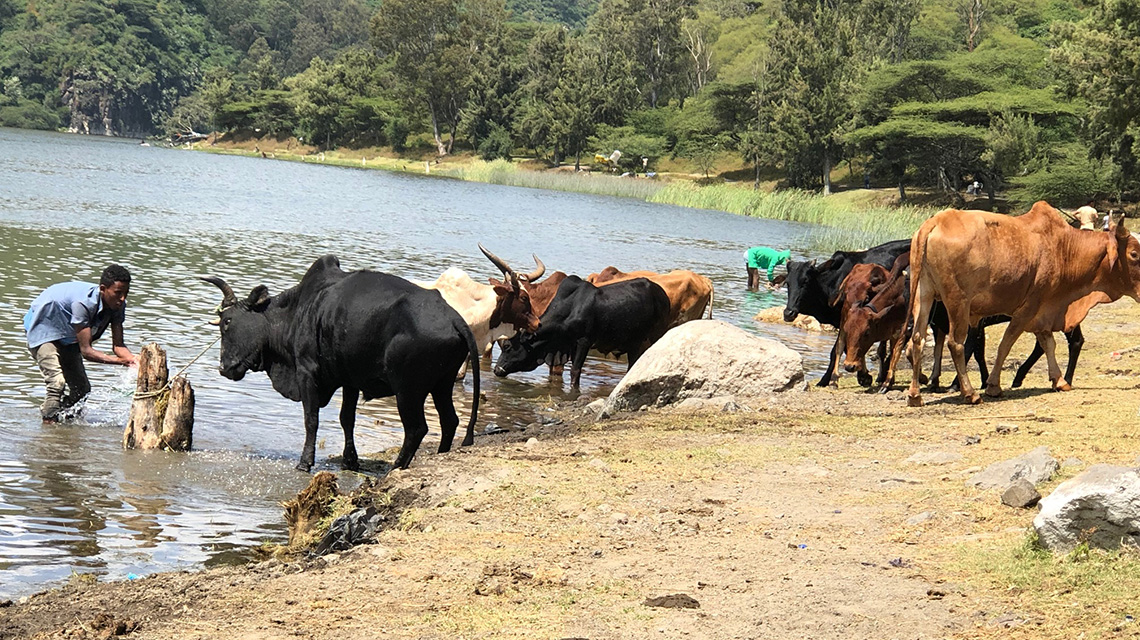
Bishoftu, Ethiopia – Ethiopia exports over a million cattle per year, and none of this would be possible without nuclear techniques. To prevent epidemics, all of the livestock destined for export, as well as domestic consumption, need to be vaccinated against animal diseases such as foot and mouth disease, Sheep and goat pox, Peste des petits ruminants (PPR), Lumpy Skin Disease, Contagious caprine pleuropneumonia and others. The vaccines are developed and produced at the National Veterinary Institute (NVI) in central Ethiopia. The IAEA, in cooperation with the Food and Agriculture Organization of the United Nations (FAO), supports both aspects of this work: vaccines are developed to fight evolving pathogens and then produced for use both domestically and in neighbouring countries.
“Livestock exports are vital to our economy and the contribution of NVI to the livestock sector is immeasurable,” said Wondemagegn Tufa, a Director at the country’s Ministry of Agriculture in charge of ensuring seamless export procedures for cattle. The ministry buys vaccines from NVI and then distributes them among farmers, including pastoralists in the eastern part of the country, whose animals are most exposed to disease because they roam across a large area and mingle with wild animals.
With 60 million cattle, Ethiopia has the largest livestock population in Africa and the fifth largest in the world, according to the World Bank. The livestock sector accounts for around a fifth of the country’s economy and close to 10% of its exports.
To keep up with increasing demand from farmers and the changing regulations of importing countries, NVI has increased its vaccine production from 93 million doses to 260 million doses per year over the last decade. This also enables it to export vaccines to neighbouring countries, including against PPR, a viral disease of goats and sheep, the eradication of which is a major goal of the African Union.
The availability and access to effective vaccines is vital for controlling and preventing the spread of many animal diseases, some of which can also spread to people. Vaccines, in animals just like in people, activate an immunological response that helps the body prepare to fight off a future disease. Some vaccinations use live microorganisms, like viruses, which could lead to the eruption of the disease. Radiation can help address this by inactivating a microorganism so that it cannot infect the vaccinated animal. At the same time, radiation does not affect the microorganism’s structure, so the immune system can still recognize it, which causes the animal to develop its protection mechanism. Irradiation of vaccines also ensures that the vaccines do not contain any contamination.
Using irradiation technology for developing vaccines is safer for the animals because it does not require additional chemicals or other compounds that are traditionally used for deactivating the viruses. These irradiated vaccines are of higher quality because they better preserve the structure of the microorganism, which results in a broader immune protective response, said Charles Lamien, an Animal Health Officer at the Joint FAO/IAEA Division of Nuclear Techniques for Food and Agriculture.
NVI, in partnership with the IAEA, is planning for developing and evaluating irradiated vaccines for major animal and zoonotic diseases, which spread from animals to human, – both novel and alternative.
The IAEA, through its technical cooperation programme, in partnership with FAO, supports NVI with training of its staff and the supply of consumables and equipment. All technical staff of NVI’s Research and Development Department have benefitted from training by the FAO/IAEA. “Whether through short courses or longer fellowships, they have all been exposed to cutting edge science,” said NVI Director General Martha Yami.
"Healthy food" - Google News
November 20, 2019 at 10:26PM
https://ift.tt/2D2PGkG
Irradiated Animal Vaccines Keep Ethiopia's Animals Healthy, Helping Exports and Food Security - International Atomic Energy Agency
"Healthy food" - Google News
https://ift.tt/2plGeWz
Shoes Man Tutorial
Pos News Update
Meme Update
Korean Entertainment News
Japan News Update
Bagikan Berita Ini














0 Response to "Irradiated Animal Vaccines Keep Ethiopia's Animals Healthy, Helping Exports and Food Security - International Atomic Energy Agency"
Post a Comment